By Lambert Strether of Corrente.
As readers probably know, plant species are suffering just as much as animal species are (if species can suffer; perhaps they do). The BBC, just yesterday:
Scientists at the Royal Botanic Gardens, Kew, and Stockholm University found that 571 plant species had disappeared in the last two and a half centuries, a number that is more than twice the number of birds, mammals and amphibians recorded as extinct (a combined total of 217 species).
This data suggests plant extinction is happening as much as 500 times faster than what would be expected normally, if humans weren’t around.
And needless to say:
All life on Earth depends on plants, which provide the oxygen we breathe and the food we eat.
Plant extinctions can lead to a whole cascade of extinctions in other organisms that rely on them, for instance insects that use plants for food and for laying their eggs.
“We depend on plants directly for food, shade and construction materials, and indirectly for ‘ecosystem services’ such as carbon fixation, oxygen creation, and even improvement in human mental health through enjoying green spaces,” [Dr Rob Salguero-Gómez, of the University of Oxford] commented.
Of course, as anybody who has read Michael Pollan’s Botany of Desire knows, plants aren’t dumb; they are, in fact, quite adept at getting us to co-evolve with them through cultivation (corn, hot peppers, roses, marijuana, opium, etc.) Pollan writes:
Matters between me and the potatoes I’m planting really aren’t any different. We, too, are partners in a coevolutionary relationship, as we have been since the birth of agriculture [and before! –lambert]. Like the flower, whose form and scent and color have been selected by bees over countless generations, the size and taste of the potato have been selected over generations by us—by Incas and Irishmen and McDonald’s customers. Bees and humans alike have their criteria for selection: symmetry and sweetness for the bee, heft and nutritional value for the human.
The fact that one of us has evolved to become intermittently aware of these desires makes no difference whatsoever to the flower or the potato. All the plants care about is what every organism cares about on the most basic genetic level: making more copies of itself. Through trial and error, these plant species have discovered that the best way to accomplish that is to induce animals—bees, people—to spread their genes far and wide. How? By playing on those animals’ desires, conscious and otherwise. The flowers and spuds that do this most effectively are the ones that get to be fruitful and multiply[1].
So did I choose to plant “my” potatoes or did the spuds make me do it? Both. I can remember the exact moment the fingerlings seduced me, showing off their knobby charms in the pages of a seed catalog. The tasty-sounding “buttery yellow flesh” sealed it. A trivial, semiconscious event, it never occurred to me that our catalog encounter had any evolutionary consequence whatsoever. But evolution consists of countless trivial, unconscious events, and in the continuing evolution of the potato, my perusal of that catalog is one of them.
However, for plants to seduce us, first we must be aware of them.That is what eliminating “plant blindness” is all about. From Sarada Krishnan, Tara Moreau, Jeff Kuehny, Ari Novy, Stephanie L. Greene, and Colin K. Khoury, “Resetting the table for people and plants: Botanic gardens and research organizations collaborate to address food and agricultural plant blindness,” Plants, People, Planet:
Of the myriad gifts plants provide to humanity, food is among the most visible, as everyone needs to eat, every single day. Due to their universal importance, food and agricultural plants would appear to represent ideal entryways to address plant blindness. Yet increasing urbanization worldwide and decreasing proportions of the global workforce in agriculture are limiting opportunities for people to have direct, hands‐on experiences with food and agricultural plants outside of retail purchasing, meal preparation, and food consumption. This disconnect is troubling, especially as the challenges to the sustainability of our future food supply necessitate that society, and certainly elected decision‐makers, have the capacity to understand the potential benefits, risks, and tradeoffs inherent to agriculture and its advancing technologies.
The term plant blindness was introduced by Wandersee and Schussler in 1998, and since then numerous studies have reported on its negative consequences with regard to plant conservation (Balding & Williams, 2016) and have outlined methods to address it (Balding & Williams, 2016; Frisch, Unwin, & Saunders, 2010; Krosnick, Baker, & Moore, 2018; Pany, 2014; Pany & Heidinger, 2017; Strgar, 2007; Wandersee & Schussler, 1999,2001). Plant blindness has led to the devaluation of plants with regard to their impact on the economy and culture, environmental sustainability, and public health (Krosnick et al., 2018).
So my simple plan to help mitigate “plant blindness” was to go to my local community gardens, and photograph[2] a lot of plants. Unfortunately, my mental picture of this splendid garden was at variance with ground truth: This horridly wet and cold May and June is just as horrid for them as for me — all we really seem to be able to produce in bulk is mosquitoes — and so they more than a month behind, too. The essay that follows will feature what plants there are, but will concentrate also on garden infrastructure. Which might give you some good ideas too, even if only for next year, whether you garden or not.
* * *
A fine pile of rich mulch, since soil is the foundation of everything.
Hay to cover the beds
A very colorful compost bin.
A sanctuary for starts.
I’m not sure what this is for. But it would look good covered with morning glories!
I believe these lovely frames are meant for cukes to climb over.
Raspberries (the sign said) with pretty blue flags so nobody steps on them.
A lovely bed of winter leeks (because what else could they be).
Frames for tomatoes, mulched with straw.
Greens, I believe. Well along!
Raised beds, covered with translucent non-woven fabric floating ow covers over hoops. I’m not sure why this particular geometry, but it’s pleasing to the eye. Generally, I deprecate wood-chip paths, because they remind me of horrid chemically treated bark mulch, but clearly I am wrong and these gardeners are right. Look, no weeds!
An artsy close-up. I also like the use of a handful of woodchips to prevent the fabric from blowing; it’s very ermaculture-esque to use what comes to hand.
A lovely bench. All gardens should have a place to sit.
* * * I’m not sure how to conclude, except to exhort you to look closely at plants, and if possible to grow them. At least for the natural world in which we play such a perilous role, it’s better to see than to be blind.
NOTES
[1] It has just occurred to me that Genesis 2:15-2:17 is a story about a food forest; and that the Fall is the transition to agriculture, humanity’s greatest mistake. Not a new thought, I am sure, but new to me.
[2] I’m experimenting with a new camera, and with something a little more lively than setting up on a tripod and taking long exposures. So some of these images may be less than perfect, because I am not controlling my depth of field very well.
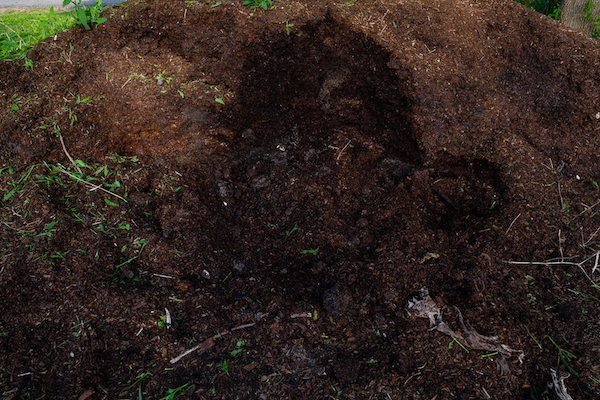
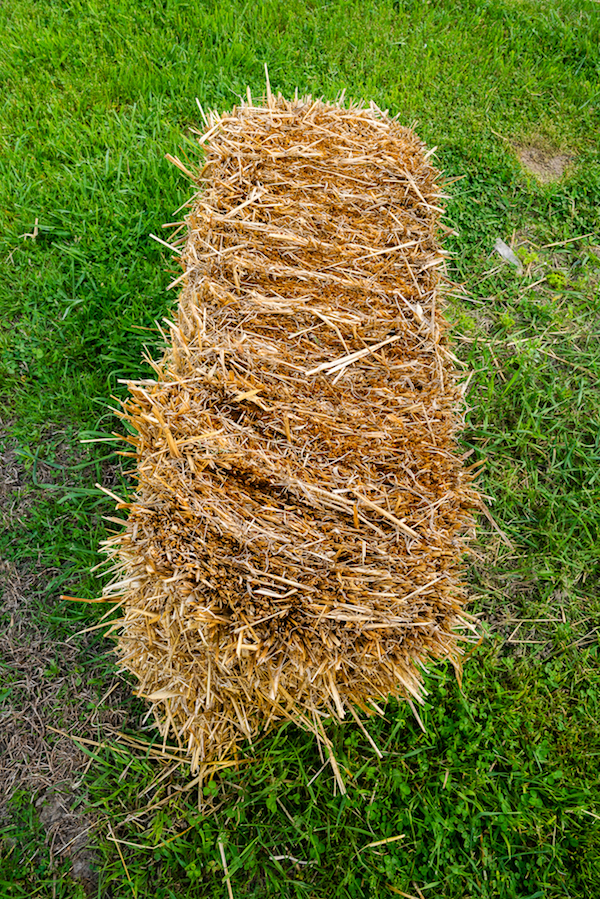
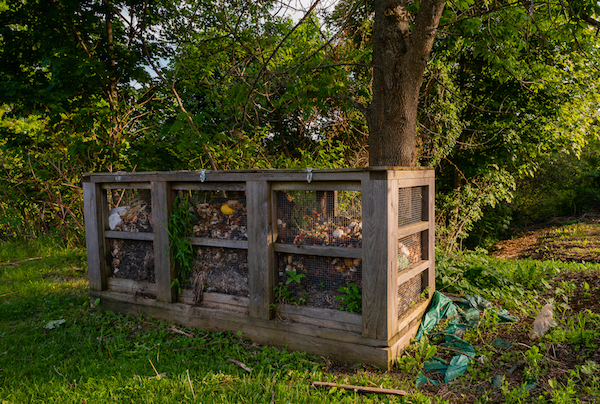
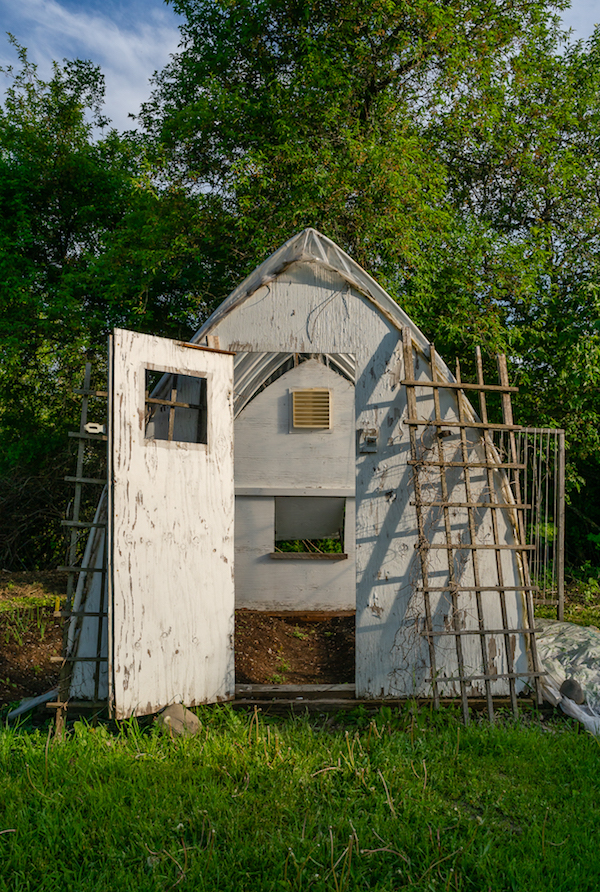
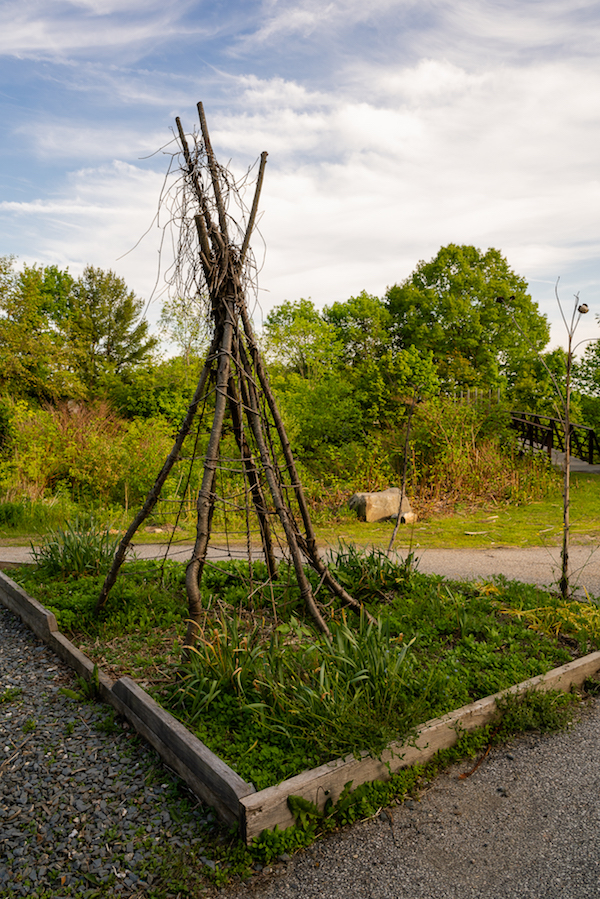
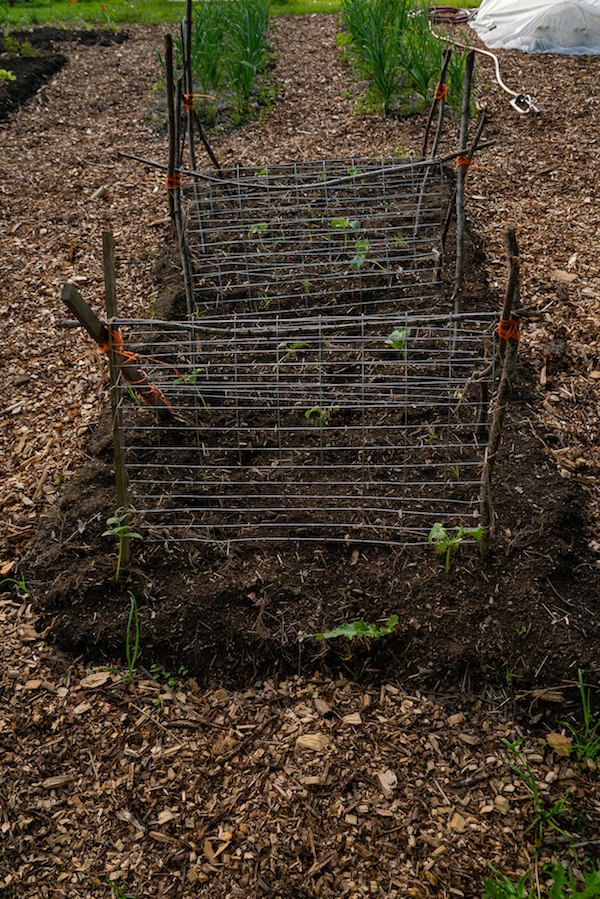
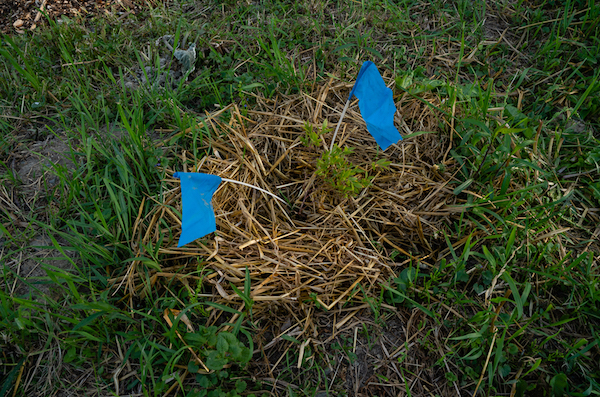
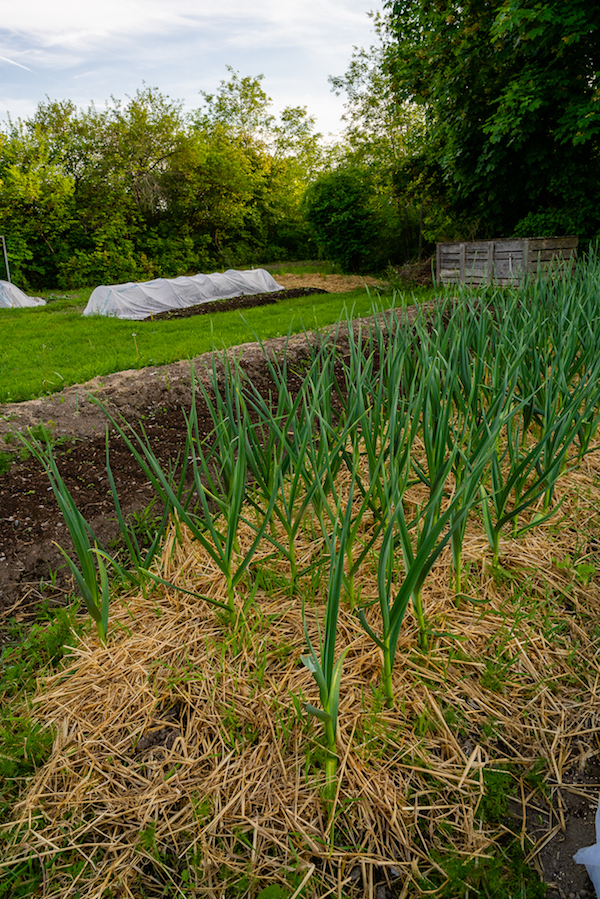
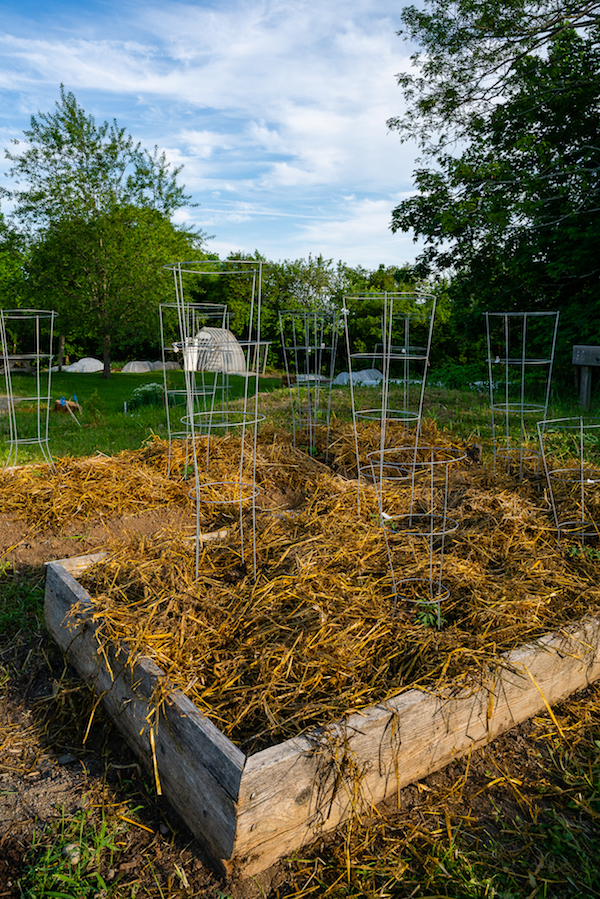
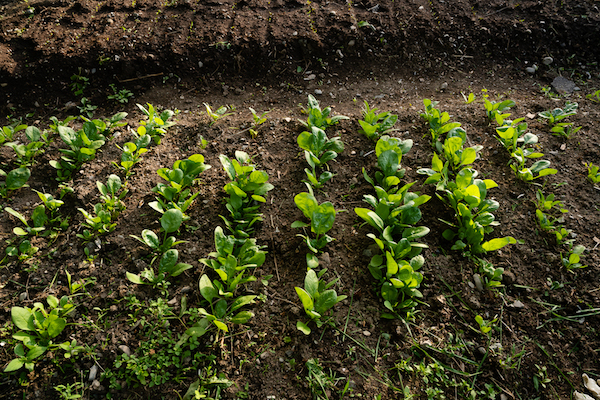
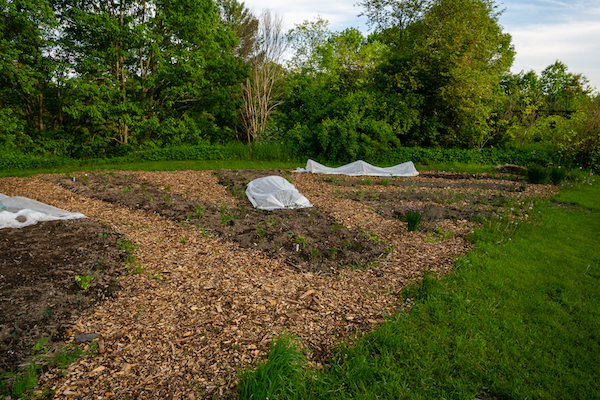
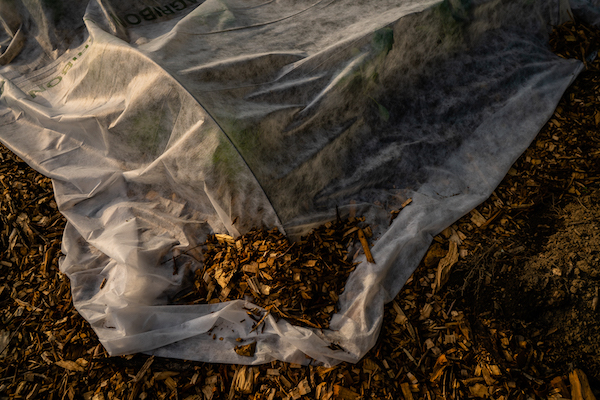
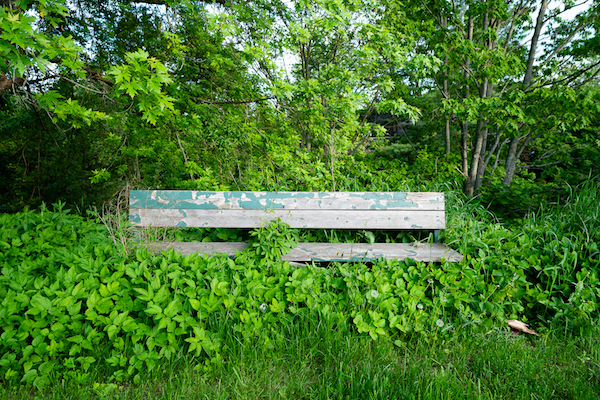


Bean pole. Climbing trellis for several varieties of “pole beans”, “lazy wife”, “scarlet runner”, “blue lake”, “climbing french”.
Of course!
We live at a street corner that is quite busy with auto traffic during commute hours and with pedestrians throughout the day. For some years now we have been planting sunflowers and wildflowers that produce a showy display for the multitude of passersby. Our little patch of planted dirt (~150 square feet) has become something of a local institution evoking many compliments and attracting photographers, painters with their easels, as well of bees, bugs, birds and squirrels. It’s quite a lively little spot.
This is why encouraging gardening is not consumerist (especially if you don’t buy anything from big box stores (which you should not for plants, at least, because they are disease vectors)).
A double parentheses? Haven’t seen that since reading the Gulag Archipelago 3. My one pet peeve against NC is that Yves has made parenthetical comments ok, which I find annoying. They should be used very sparingly. There I’ve said it. Years of that being bottled up gone. I won’t mention it again.
Interesting post by the way.
I love the photos of the community gardens,what an array of vegetables, it looks like it will be such a lively place when all the plants grow to their fullest.
I am a gardener so I don’t have plant blindness, in fact the plant have me in their thrall….the seed catalogues are my downfall. I want every one of them little beauties.
A day spent in the garden is a good day
How true that is, marieann, for people that can see the jungle for the bees !
Our surrounds is, for al, practical purposes, a full-time job (almost typed ‘gig’ .. Ha!) .. at least from March .. when composting and vegie planting begin in ernest .. to November .. when the last fruit to be picked, the Medlars, are sitting on trays, bletting to ripeness, before freezing.
There is no doubt in my mind, that there exist the God of Garden Irony – for which has seen fit to make weeds out of some of my cherished plants, which is fine, as I rogue-out what is too much … but always leaving some to do their thing, such as the little marsh orchids, the salvias, chamomile and columbines .. and the lemon balm, to name some examples. Since the lots both in front, and behind of our lot were completely logged-off of 60+yr old mixed 2nd, or 3rd fir forest plantings, the avians especially find sanctuary in our admittedly overplanted speck of terra-firma, as do the insects.
I’d also like to mention that when the sweet cherry tree starts to get that saggy look of drought stress, that means it is time to partially drain the little backyard pond of maybe half it’s water, directiing the outflow to the tree for needed moisture AND nutients .. then commence to refilling the pond, which of course the aquatic denizens appreciate .. to be done again later in the summer, as needed. Nothing gets wasted here !
It’s another hot day – time check on the growing bee-beard ..
polecat…your garden sounds like heaven…fruit trees, ponds etc. I do have a serviceberry tree and I had hoped for enough to make a pie….but the robins always beat me to the berries.
Serviceberry .. Allegheny amelanchier ?? Tasty ?? We have A. Alnifolia, a native here .. aka .. common name Saskatoon. Have several, all seed dispersed by the local neodinosaurs. Not enough fruit to use, so left to the winged ones. We planted, some years ago, native huckleberries .. a pain to harvest, but do they ever make the best conserve !
And thanks for the compliment, marieann. The garden .. well, in the immortal words of Adrian Monk .. it’s a blessing ‘:] .. AND a curse ‘:( … mostly a blessing though – the curse is the blisters and aching back. Keep at it. A garden is a ever evolving entity, never static, as you probably know, and as a human, you get to be a god of sorts, or rather, to use an Atwoodian term, one of God’s gardeners.. involved in it’s creation .. in a benevolent kind of way, of course. I liken myself as a kind of an incidental contemporary helper in the manner of Assisi, without the theology. I ain’t no saint, and consider some of what I do as a penance for prior sins. Taken me over a half century to get there !
i collect old/broken sunglasses to put in fruit trees for birds.
they have a keen eye for Eyes, which is what sunglasses look like to them.
bits of rope work on mocking birds(resembles a snake)
Daniel Quinn’s novel, Ishmael, puts forth the notion that the Old Testament was originally a story from the mythic oral tradition of hunter-gatherers that was expropriated by agriculturalists who misinterpreted its meaning.
Alas, we are all farmers now, or dependent upon them, and must find ways to make the best of it.
So I wandered off in thought and wondered how in this world we are supposed to get feeding ourselves right. There’s the Monsanto evil on one hand, and even if we do untangle the government from private industry’s clutches do we run the risk of a modern Lysenko?
What was really disturbing, though, was when I wandered over to Wiki to freshen up on Lysenko. Three things caught my eye – not because Lysenko had any idea what he was talking about, but the dismissive way the author(s) treated these items:
1) and that “natural cooperation” was observed in nature as opposed to “natural selection”.
Well, aren’t we beginning to see that? Tree roots and etc? “As opposed to” is wrong, of course. There are both.
2) insisting on using only hybridization and grafting, as non-genetic techniques.
“only” I guess is the operative word, as there’s nothing wrong with hybrids or grafting – why is hybridization classified as non-genetic, though? But the really, really interesting one:
3) the implication that acquired characteristics of an organism—for example, the state of being leafless as a result of having been plucked—could be inherited by that organism’s descendants.
Are we so darn sure that is still simply wrong? Not the plucked leaf part, yes that is stupid. But we have been reading, I think on this very website, about bacteria just swapping DNA “as a result of being plucked” by another one for survival. I’m stretching this a bit, but just making the point that there “are stranger things in Heaven and Earth” than biologists like the one that probably wrote the Wiki philosophizes about.
Anyway sometimes the mind wanders…it was a bit unsettling though.
I’d be careful about those morning glories. A neighbor planted some 15 years ago and I’m still pulling them out of my garden…
Not in Maine, oddly. I also actually have to grow honeysuckle. And it doesn’t always survive.
Mother Nature provides vivid color in vast unkempt gardens all over from late January to April as a plethora of wildflowers emerge & bask in beauty before dying back as is their custom.
I started out on vegetables, but found I wasn’t into sprinters, and wanted something long lived that I could leave as an inheritance after i’m gone, and that’d be apple trees. My dad was really into growing fruit & nut trees, and one of them was a Macadamia tree, and the shell is virtually indestructible, we needed a certain kind of nutcracker to get to the meat of the matter. And the one thing I hated as a kid, was putting in the water system, we had to dig ditches for dad and lots of pipe was laid and it was tedious work. Nowadays, I can set up a poly pipe drip system above ground for 20 trees in a hour or 2, so easy in comparison.
Our food forest is almost all one of a kinds, and yes, fruit isn’t dumb. As much as i’d like to grow certain apple varieties, a good many of them can’t do our 100 days of 100 degrees in the summer, and if there is anything to a given variety being best suited @ home, a Sierra Beauty must be loving it, as it’s our biggest tree & producer, it’s 10 feet tall and holding, wants to be 25 feet tall, but we’ve got a prune up agreement. A rare tree in the orchard that i’ve doubled up on, and planted another, in the malus palace.
Farming, Gardening, both are just other forms of geoengineering that got us into our current mess.
So yes, we fell from Eden and left it to rot in our own waste, and only God can recreate it. But we have to let HIM recreate it.
You’re absolutely right about farming and gardening being geoengineering, at least at the scale of BigAg. I think small scale diverse, regenerative farming can be closer to habitat-formation.
And whadda ya mean, “HIM”? As the late Bea Arthur would [not] have said, “Gaia’s gonna getcha for that.”
I can see God as a him, you can see God how you want. God does not care, only people into identity politics care.
Gaia is not God, just another thing God make according to His/Her/They/Potatoe/Potato/Them/She/It’s laws.
To think you know as much as Gaia or God to form a habitat is hubris.
For those interested in learning directly from nature how to create balance in any gardening/agri situation (whether a single potted plant, ranch, flower garden, etc.), I’ve learned a lot from the Perelandra Nature Research Center. Machaelle Small Wright has worked directly with nature intelligence for over 40 years, and has been generous about passing on what she has learned so others can form their own partnership. It’s not a single technique or approach. Rather it’s about developing a communication strategy, ways of asking questions instead of controlling (according to what we “know” is the “right way”).
You are right that humans doing what they think is best for an environment–even when genuinely well-meaning–can cause a lot of problems. The good news is that when we work in a conscious two-way partnership, things can turn around in unexpected and remarkable ways.
I’m currently re-reading, aloud, her latest book, “Pivot”. Amazing stuff.
Exploring an active two-way partnership can be exciting and it won’t appeal to everyone. It’s my way of trying to be part of the solution be asking nature how to create balance, rather than inadvertently adding to problems.
thank you for telling us ab out Wright and Pivot. I’ve recently learned so much from Brilliant Green by Stephano Mancuso and other books. So much we’re learning just before the end.
That looks like a good book. Thank you for mentioning it.
“just before the end”? I hope not, but we sure need to wake up and approach things from the perspective of a conscious partnership, IMO.
Nature can change form in the twinkling of an eye. This is clear from reading Pivot. But that means we have to think, feel, express and act from a broader perspective than we often do.
Consciousness is an apple hanging from the Tree of Knowledge.
You do not ask nature how to create balance. It just creates balance. This is why we have climate change. The Daoists already know this. Let the world be and it will govern itself.
“Let the world be and it will govern itself.”
John C. H. Wu translation.
Your thoughts also remind me of Wendell Berry:
(I suspect you might differ with that last sentence.)
And to take that further (?), we strive to make the world conform to how we think our mind works: straight lines; everything in its neat compartment; clear, transparent causal links. Instead, we should strive to let our minds be the way that the world really is: flowing into every niche; evolving, never static; interacting in the moment with its environs. All it takes is to surrender our hubris and aggrandized sense of our own power.
Wonderful to know someone else sees this.
“And that requires that we make the effort to know the world and learn what is good for it.”
I have no disagreement with that at all. For what might be good for the world is leaving it alone!
With all the randomness you can find in a forest I have never heard anyone complain that it is messy.
You’re so right! that nature”just creates balance”.
In contrast, we humans are here and interacting with nature, and we don’t know how to create balance automatically, like nature does.
That’s why it can be effective and mind-blowing to consciously connect to nature intelligence (the intelligence behind any form) to ask, rather than trying to guess on our own.
All organisms must incorporate unto themselves elements from their environment including in many instances other organisms and thus alter that environment and the genetic futures of the species they consume or out compete.
To which god do you refer? There are so many from which to choose. Not that patriarchal psycho authoritarian narcissist of the Old Testament I hope.
I refer to the same God you do. Take your pick.
Thank you for the lovely pictures! Nice to see a garden that hasn’t been razed by family-blogging squirrels, not that I’m bitter or anything. Now off to replant my broccoli for the third time already this year and see what else has been eaten today.
My indoor cats get spring fever this time of year and look longingly out the window when the small fauna shows up to sample my flora. It’s getting harder and harder to resist the temptation to make them indoor/outdoor felines when the tree rats start going to town on all my hard work.
More evidence the old narrative concerning agriculture is inadequate:
https://www.sciencedaily.com/releases/2019/05/190520115646.htm
I think your Leeks may be garlic.
I hope the raspberries show the same restraint you claim for Morning glories and Honeysuckle.
Yes, they look a lot like my over-winter garlic. All in the allium family in any case.
Is it possible that what you are calling winter leeks are instead ramps?
Definitely not ramps (I grow those, and they look quite different), but I think the little guys in this picture might be garlic (which I also grow and am closely familiar with!) rather than leeks.
That bale is clean straw. Hay is full of weed seeds.
Those tomato cages will prove to be useless when the tomato plants get big, they will tip over unless they are anchored somehow. A roll of 6 inch concrete mesh woven through and anchored with a ground rod makes a sturdy tomato cage.
I have found Kolibre Terre Sonnenblume an interesting essayist on botanical matters. Seen writings mostly on Counterpunch over the last year or two.
The phenomenon of plant blindness is most pronounced in literature. In much pre-war literature, the level of erudition and fluency by many authors on the subject of botany is pronounced, and ruthlessly exposes how little I know about the field.
I get my chief botanical fix from playing golf (always walking, as one should if they are able). Not on overly-manicured monstrosity courses in the American style, thank god. The more native vegetation the better. Dunescapes in particular are wonderful environments to walk through.
I get it from walking in natural areas and surburbia. I always stop to notice the plants, what and how they are doing (I notice when disease are stressing native plants etc.).
I don’t need to own property and garden to relate to plants anymore than I’d need to personally own a bunch of birds to go birdwatching. Which is a darn good thing, as I’m not rich, and it’s good somethings in life are free or near so. The best things they say.
Nice photos of the garden. One quibble: that is straw, not hay, to cover the beds. Hay is a product of cutting the plant while it’s green (contains nutrients) and to be used as feed. While straw is a by-product of cutting a plant for, usually, it’s grain (seed) and the plant parts that remain is called straw. Straw is normally yellow in color and contains little nutrient.
Don’t want any novice gardeners to buy “hay” for mulch.
I find this story insulting.
When the invaders, with their high-tech weapons, conquered and destroyed an indigenous culture and cut down all the trees, dammed the rivers, killed the animals, it broke the hearts of the the locals. Being “plant aware” made not a bit of difference.
Just because the subjugated peoples of an invading army generations or centuries later have allowed themselves to become indifferent and irgnorant of the natural world will not change the fact they have no control over what their overlords are doing to their surroundings. This is ridiculous.
Until we get out under the thumb of the ruling elite, the business and political structures they have built to control our world, this little gardening will be a feel-good exercise – a hobby, like bowling or knitting or weight-lifting.
maybe gardening but people can have hobbies too (people who are 100% consumed by politics might not be the people you want in politics …)
But suppose we wished to have a real and radical movement to protect the environment and the natural world, nonviolent or militant, wouldn’t it help if people learned to care about it especially when young. A movement has to have some emotional substrate from which to grow out of right? Well fear of the apocalypse is one I guess …
So maybe that’s all. I mean it seems there is only a few ways that things will change, we change the hearts of the ruling class (that’s a long shot, but one could try it), or the rest of us take action within and outside of electoral politics to change things.
I’m not an optimist btw, it’s late, just saying.
https://www.outsideonline.com/1825096/place-where-two-fell